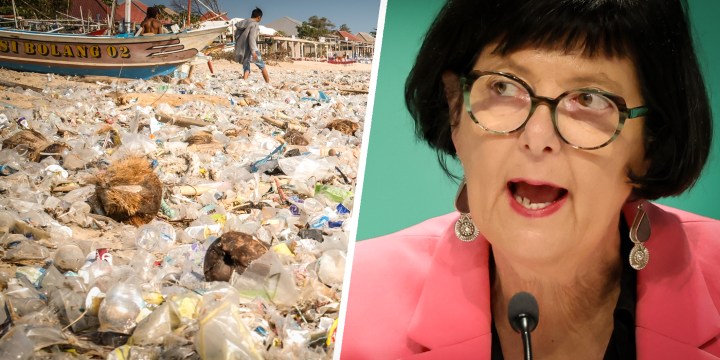ENVIRONMENT
SA to push for financial support in internationally binding plastic pollution treaty

Forestries, Fisheries and Environment Minister Barbara Creecy and plastic industry stakeholders met before negotiations in Canada next week to take forward a legally binding draft treaty on plastic pollution.
Almost two years after presidents and environment ministers met in Nairobi, Kenya, and adopted a draft treaty to end plastic pollution, leaders will gather in Canada next week to develop the treaty.
South Africa hopes the final treaty will help to end plastic pollution while making provisions for protecting human health and the environment from plastic leakage.
The country’s position was shared at a stakeholder engagement meeting last week that included Plastics South Africa, the International Alliance of Waste Pickers, the South African Local Government Association (Salga) and the Congress of South African Trade Unions.
The engagement preceded the fourth Intergovernmental Negotiating Committee (INC-4) in Ottawa, Canada from April 23-29.
Read more in Daily Maverick: Plastic, plastic everywhere – decades of talking moves closer to global action
SA’s negotiating position
Forestry, Fisheries and Environment Minister Barbra Creecy said South Africa was in strong support of the treaty being concluded by the end of 2024 as promised by global leaders.
“South Africa remains resolute in supporting global efforts to end plastic pollution. Plastic pollution affects the terrestrial and aquatic, including marine environments. South Africa boasts a coastline that covers over 3,000 kilometres, and it is in the interest of environmental sustainability that South Africa is actively engaged in the INC process.
“The recognition of the threat plastic pollution poses to human health, ecosystem functioning and the marine environment keeps the South African members of the INC hard at work.
“Given the versatility of the plastic product, the lifecycle approach requires a multistakeholder focus, and thus the government is considering views of interested and affected parties in the negotiations of this internationally legally binding instrument on curbing plastics pollution,” Creecy said.
South Africa is considered to have the highest plastic waste generation rate in Africa, producing 28kg of waste a year per person, compared to 16kg a year per person for the rest of the continent.
In addition, the country contributes about 35% of the plastic pollution leaking into the marine environment in southern and east Africa, an International Union for Conservation of Nature (IUCN) study found.
While South Africa struggles with plastic pollution because of excess plastic that isn’t recyclable and waste management services that don’t extend to communities, a recent study by Ipsos found that nearly nine out of 10 South Africans support the inclusion of a global ban on single-use plastic in the treaty. Nine out of 10 South Africans also believe that there should be a ban on the hazardous chemicals used in plastic.
Stakeholders
More recently, the United Nations Industrial Development Organisation (Unido) and WWF South Africa initiated a five-year project to support a circular plastic packing system to limit plastic waste pollution from the food and beverage industry that ends up in landfills.
Creecy said the plastic industry had to grow sustainably to ensure that the environment and human health were not harmed.
During its presentation, Plastics SA said the treaty should focus on ending plastic pollution, not production as this would limit plastic supply and increase the cost of production, which would hit consumers.
Salga said that at the current rate of waste collection expansion, it would take about 50 years before SA municipalities could collect 80% of household waste. At present, the collection rate is 66.3%.
The local government association said it hoped the treaty would help to improve waste services by addressing funding and infrastructure challenges. Salga said SA municipalities spent an average of about R100-million a year on solid waste management.
The International Alliance of Waste Pickers, which represents 460,000 organised waste pickers from 34 countries, said it was important that the final text includes “waste pickers”, “workers in informal and cooperative settings” and a “just transition”.
Representatives from civil society said, “All measures taken in regulating the full life-cycle of plastics must be seen through a just transition lens for all workers affected by the planned transformative changes in the global plastics economy.
“However, recognition and priority must be given to the important role waste pickers and waste workers play in cooperative settings who divert more than 60% of waste from landfills. The treaty text must include a definition of just transition in the context of plastics that reflects the priorities of all affected communities, groups, and territories.”
Read more in Daily Maverick: ‘Shameless stalling tactics’: Talks on new global plastic treaty ‘held hostage’ by petrochemical industry
Existing text
Deputy director-general of the DFFE Mamogala Musekene said South Africa recommended a dedicated financing aspect to the treaty, with a push to have the fund operational shortly after the treaty was concluded.
A revised draft text of the instrument from INC-3 was published earlier this year that included sections that sought to address the objectives of the legal instrument, monitoring mechanisms, a just transition in the plastic industry, plastic chemicals of concern, extended producer responsibility (EPR) and a financing instrument, among other aspects.
Daily Maverick understands that some member states have reservations about aspects of the draft treaty that deal with the intersection of financial interests and environmental imperatives.
A global EPR system poses challenges, particularly around implementation, while chemicals in plastic are also a major concern. Some of these challenges may be addressed in the upcoming instrument or be addressed through other existing treaties on plastic waste and chemicals. DM



















 Become an Insider
Become an Insider
It is a positive development that there are going to be negotiations to develop a treaty to address plastic waste, which is a very serious health and environmental issue globally. There is such an enormous volume produced, and quite a lot is not even properly recyclable. It is extremely difficult to avoid producing plastic waste, even with groceries. Some countries such as Kenya have banned plastic bags and undertaken initiatives to substantially reduce the waste.
What’s happening to the tax revenue from sale of plastic bags…is it just going into general revenue.
I have seen articles on How California’s plastic bag ban made plastic waste worse!
You have to change peoples attitudes to waste but that is not going to happen!
Like COP 26, this pact should be led by Environmentalists who are free agents, however like COP, one does not ask El Chapo to fight the war on drugs, one does not give polluters or Sheiks the lead on environmental issues.|
The biggest polluter: Plastics SA said the treaty should focus on ending plastic pollution, not production as this would limit plastic supply and increase the cost of production, which would hit consumers
Why do we have to wait for a treaty, which could take years more before finalised given the stupid demands by politicians (and demands to include “waste pickers”etc)? Just start! Start phasing out plastic straws, cutlery, styrofoam packaging, etc.